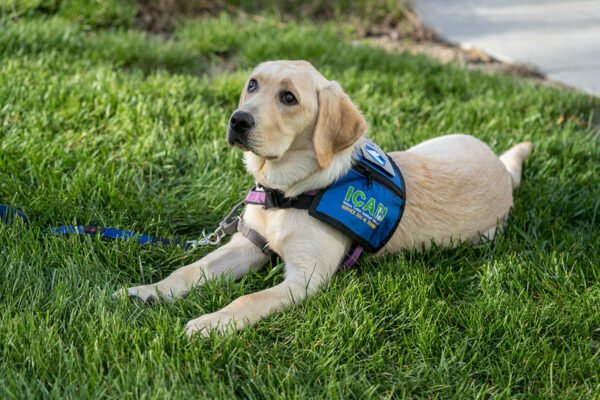Service dogs serve as lifelines for individuals with disabilities, offering unwavering support and companionship that can truly be life-changing. These exceptional canine companions are not just born with the innate ability to guide, protect, and assist their handlers; their skills are acquired through rigorous and specialized training. As the demand for service dogs continues to grow, ensuring that these highly trained animals possess the necessary skills and temperament becomes increasingly crucial. Certification in service dog training plays a pivotal role in guaranteeing that these remarkable creatures are equipped to meet the diverse needs of their handlers, providing them with the independence and freedom they deserve.
Table of Contents
- The Importance of Certification in Service Dog Training: Ensuring Competency and Safety
- Enhancing Public Trust and Accessibility: The Role of Certification in Service Dog Training
- Benefits of Certified Service Dog Training: Enhanced Quality of Life for Handlers
- Key Elements for Effective Certification in Service Dog Training
- Addressing Challenges and Ensuring Consistency: Establishing Standards for Certification in Service Dog Training.
- Q&A
- Future Outlook

The Importance of Certification in Service Dog Training: Ensuring Competency and Safety
Ensuring Competency and Safety
Service dogs play a vital role in the lives of individuals with disabilities, providing them with independence, companionship, and support. To guarantee the well-being of both the handler and the public, it is crucial to establish a system of certification for service dog training. Certification serves as a means of ensuring the competency of both the dog and its trainer, as well as guaranteeing their ability to navigate various situations safely and effectively.
By implementing a certification process, several important benefits are achieved:
- Standardized Training: Certification establishes a set of criteria and guidelines that trainers must adhere to. This ensures that all service dogs receive consistent and comprehensive training, resulting in reliable and predictable behaviors.
- Public Safety: A certified service dog undergoes rigorous training to develop impeccable behavior, allowing them to flawlessly perform their duties and interact safely with the public. This helps prevent any potential harm or disruptions caused by untrained or poorly behaved dogs.
- Legal Protection: Certification provides legal recognition and protection for service dog handlers. It allows them to access public places, housing, and transportation without discrimination or unnecessary challenges. It also protects them from false service dog claims that could undermine the overall importance and credibility of service dogs in society.
Overall, certification ensures that service dog training meets high standards of proficiency, creating a safer and more inclusive environment for individuals with disabilities. It instills confidence in the general public and ensures that the invaluable support these dogs provide remains unquestioned and respected by all.

Enhancing Public Trust and Accessibility: The Role of Certification in Service Dog Training
Service dogs play a crucial role in the lives of individuals with disabilities, providing independence, companionship, and assistance in everyday tasks. However, as the demand for service dogs increases, so does the need for effective certification standards that ensure the quality and reliability of these remarkable animals. Certification in service dog training plays a vital role in enhancing public trust and accessibility for individuals with disabilities.
Certification programs provide a structured and standardized approach to training service dogs, ensuring that they are equipped with the necessary skills and behaviors to perform their duties reliably. These programs cover a wide range of areas, including obedience training, public access skills, and specialized task training. By adhering to these certification standards, service dog trainers demonstrate their commitment to producing well-trained and reliable service dogs.
- Public Trust: Certification acts as a guarantee that the service dog has undergone extensive training and is capable of behaving appropriately in public settings. This assurance helps build trust between service dog handlers and the general public, increasing acceptance and understanding.
- Accessibility: Certified service dogs are granted legal rights and protections under various laws, such as the Americans with Disabilities Act (ADA). These laws ensure that individuals with disabilities can bring their service dogs to public places, access services, and fully participate in society.
- Quality Control: Certification programs set a high standard for service dog training, promoting consistency and quality in the industry. The rigorous evaluation processes validate the skills and abilities of both the service dogs and their trainers, ensuring that the highest level of training is provided and maintained.
Overall, certification in service dog training plays a crucial role in enhancing public trust and accessibility for individuals with disabilities. It provides assurance that service dogs are well-trained, reliable, and capable of carrying out their duties. By upholding certification standards, the service dog community ensures that these remarkable animals continue to positively impact the lives of those in need.

Benefits of Certified Service Dog Training: Enhanced Quality of Life for Handlers
Service dogs play a vital role in the lives of individuals with disabilities, providing assistance and support on a daily basis. When these dogs undergo certified training, the benefits extend beyond the handlers’ expectations, leading to an enhanced quality of life.
One of the key advantages of certified service dog training is the increased independence it offers to handlers. With the proper training, service dogs learn a wide range of tasks that aid in daily activities. These tasks may include retrieving items, opening doors, turning on lights, and even providing physical support. By having a well-trained service dog, handlers can regain some of the independence they may have lost due to their disability.
Furthermore, certified training ensures that service dogs are well-behaved and under control in various environments. This creates a safer and more comfortable experience for both the handler and the dog. Handlers can confidently navigate public spaces, knowing that their service dog is trained to remain calm and focused, allowing them to fully participate in society. Additionally, the bond between a handler and their certified service dog is strengthened through training, fostering a sense of companionship and emotional support.
- Increased independence for handlers in daily activities
- Well-behaved and controlled behavior in various environments
- Strengthened bond and emotional support for handlers
Certified service dog training goes beyond providing physical assistance; it empowers handlers and enhances their overall quality of life. The combination of increased independence, reliable behavior, and emotional support creates a harmonious partnership between handlers and their service dogs, ultimately resulting in a more fulfilling and enriched life.
Key Elements for Effective Certification in Service Dog Training
Identification and Selection of Service Dog Candidates
In order to provide effective certification in service dog training, it is crucial to begin with a thorough and meticulous identification and selection process for potential candidates. This process involves evaluating various factors such as temperament, intelligence, and behavioral traits that are essential for performing service dog tasks. The candidates should display a willingness to learn, obedience, and the ability to handle different environments.
To ensure a successful certification program, it is imperative to establish a comprehensive set of criteria for selecting service dog candidates. These criteria should encompass qualities like stability, socialization, and adaptability. Identifying and selecting dogs with these attributes lays a solid foundation for the training process and increases the chances of the dogs successfully completing their certification as service dogs.
Structured and Diverse Training Program
Another key element for effective certification in service dog training lies in implementing a structured and diverse training program. This program should encompass various aspects of training, including obedience, task-specific skills, and public access training. Incorporating diverse training exercises and scenarios allows the dogs to develop a wide range of skills and adaptability to different environments.
The training program should include both theoretical and practical components, providing a comprehensive understanding of the necessary skills and knowledge required to train service dogs. Incorporating positive reinforcement techniques and continuous evaluation throughout the program ensures that the dogs are progressing and meeting the required standards for certification. Additionally, creating a supportive and nurturing environment for both the dogs and trainers is vital in fostering a successful and effective certification process.
Thorough Evaluation and Assessment
No certification process is complete without thorough evaluation and assessment of the dogs’ abilities and skills. Regular assessments should take place during the training program to ensure that the dogs are consistently meeting the standards set for certification. These assessments can include practical tests, behavioral observations, and mock scenarios to ensure the dogs are prepared for real-life situations.
Furthermore, involving third-party evaluators or experts in the field can add an objective perspective to the certification process. Their input can help validate the dogs’ capabilities and ensure that the standards set for certification are robust and reliable. By conducting thorough evaluations and assessments, the certification in service dog training becomes a credible validation of a dog’s competence and suitability to support individuals with specialized needs.
Addressing Challenges and Ensuring Consistency: Establishing Standards for Certification in Service Dog Training
When it comes to service dog training, there are numerous challenges that need to be addressed in order to ensure consistency and establish standards for certification. These challenges include:
- Varying Training Methods: There is a wide range of training methods used by different trainers, which can lead to inconsistencies in the quality of training provided to service dogs.
- Lack of Regulation: Currently, there is no standardized certification process for service dog trainers, resulting in varying levels of expertise and professionalism within the industry.
- Evaluating Training Effectiveness: It can be difficult to measure the effectiveness of service dog training programs, particularly when it comes to evaluating the dogs’ ability to meet specific needs of individuals with disabilities.
To address these challenges and ensure consistency in service dog training, it is crucial to establish comprehensive standards for certification. These standards should outline the required qualifications, training methods, and evaluation criteria for service dog trainers. By doing so, it will promote professionalism, effectiveness, and accountability within the industry.
In addition, establishing certification standards will benefit individuals with disabilities who rely on service dogs for assistance. They can have confidence in the training provided to their service dogs, knowing that certified trainers adhere to a set of consistent and reliable standards.
Q&A
Q: Why is certification important in service dog training?
A: Certification ensures that service dogs are properly trained to perform essential tasks, providing the necessary assistance to individuals with disabilities in their daily lives. It guarantees that the dog has undergone rigorous training to meet specific standards of behavior and obedience.
Q: How does certification benefit individuals with disabilities?
A: Certification ensures that individuals with disabilities receive reliable and effective assistance from service dogs. It gives them confidence that their furry companion has been trained to handle different situations, promoting independence and enhancing their quality of life.
Q: What are the advantages of certification for service dog handlers?
A: Certification provides service dog handlers with legal protection and access rights to public places. It helps them navigate societal challenges and educate others about their rights, ultimately fostering acceptance and understanding within the community.
Q: Can service dogs be trained without certification?
A: While it is possible to train a service dog without formal certification, it is highly recommended to seek certification from recognized organizations. Certification ensures that the dog meets specific training standards, increasing their reliability and decreasing the likelihood of issues arising in public environments.
Q: Who provides certification for service dogs?
A: Certification for service dogs is typically provided by reputable organizations specializing in service dog training. These organizations have established procedures and guidelines to evaluate and certify service dogs, ensuring they meet the necessary requirements to assist individuals with disabilities.
Q: How can certification be obtained?
A: To obtain certification, handlers and their service dogs must undergo an assessment conducted by a certified trainer or organization. This evaluation typically involves testing the dog’s obedience, task performance, and ability to remain calm in different environments, among other criteria.
Q: Are there different levels of certification?
A: Yes, there are typically different levels of certification based on the dog’s training and abilities. These levels may vary depending on the certification organization, but they generally progress from basic obedience to more advanced skills and task-specific training.
Q: Does certification need to be renewed?
A: Yes, certification for service dogs usually needs to be renewed periodically. This ensures that the dog’s skills and behavior remain consistent over time. It may involve re-evaluation or additional training to ensure that the dog continues to meet the necessary standards.
Q: Are there any downsides to certification?
A: While certification provides numerous benefits, it can also be accompanied by financial costs and time commitments associated with training and evaluation. Additionally, the certification process may vary between organizations, making it important for handlers to research and choose a reputable certifying entity.
Future Outlook
As we conclude our exploration into the captivating world of service dog training, it becomes evident that certification holds a paramount significance in this realm. Like a noble knight adorned with shining armor, a certified service dog stands as a beacon of hope and independence for individuals with disabilities. Through rigorous training, these remarkable companions acquire skills that can only be rivaled by wizardry, assisting their handlers in navigating the challenges of daily life and unlocking doors to a world of possibilities.
Certification, a sacred emblem bestowed upon these extraordinary canines, unlocks doors that would otherwise remain firmly sealed. Picture a majestic castle in the distance, untouched by the winds of doubt and skepticism. Certification acts as the enchanted key, opening the gateway to public spaces and establishments, breaking down barriers that hinder the full integration of those in need. It serves as undeniable proof of the service dog’s unwavering commitment to their duties, a mark of distinction that separates them from the ordinary dogs in the local park.
But certification is no mere trophy to be displayed on a mantle; it carries with it immense responsibility. Trainers, much like the wise sorcerer’s apprentices, invest countless hours and unwavering dedication into honing the skills of these remarkable beings. Through a careful alchemy of patience, love, and consistency, they imbue the dogs with the ability to perform tasks that seem straight out of the realm of magic. Whether it be offering physical support, alerting to medical conditions, or guiding those with visual impairments, these canine wizards astound us with their unwavering loyalty and intelligence.
In a world that can often feel like a mystical labyrinth, certification ensures that service dogs maintain the highest standards of behavior and proficiency. It is a testament to the arduous journey undertaken to mold these majestic beings into steadfast protectors. By preserving these standards, certification preserves the delicate bond between human and dog, allowing them to traverse the uncharted paths of life hand-in-paw.
As we lay down our quills and close this chapter on the importance of certification in service dog training, let us not forget the magical connection that exists between these extraordinary creatures and their handlers. Let us celebrate the profound impact they have on the lives of those in need, and the invaluable gifts they bestow upon our society.
In a world where hope sometimes feels elusive, the power of a certified service dog is a radiant beacon, illuminating the path forward. Humbly, let us acknowledge the significance of certification, for it is through this sacred rite that these remarkable beings earn their rightful place as guardians and companions, forever changing the lives of those they serve.
As an affiliate, my content may feature links to products I personally use and recommend. By taking action, like subscribing or making a purchase, you’ll be supporting my work and fueling my taco cravings at the same time. Win-win, right?
Want to read more? Check out our Affiliate Disclosure page.